-
PRESENT. PERFECT. (Shengze Zhu 2019)
SHENGZE ZHU: PRESENT. PERFECT. (2019)
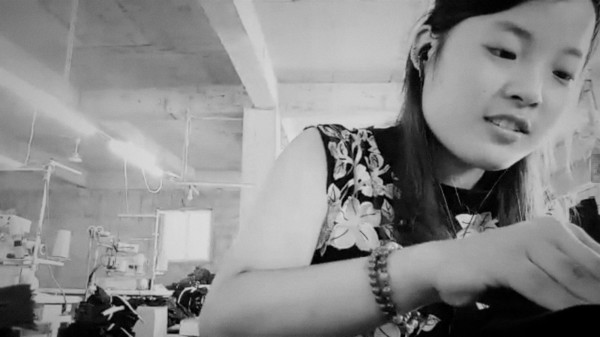
YOUNG WOMAN LIVE-STREAMING IN A MEN'S UNDERWEAR FACTORY
A film about the phenomenon of "live-streaming" in China
Documentary can be both voyeuristic and boring, and such is the case with Shengze Zhu's Present. Perfect., a film that documents the craze for "live-streaming" in China, said to have peaked in 2016, when the government moved in to set some limits. This is an online combination of exhibitionism, or simply self-vérité documentation, where the "anchor" hooks up with a site where others can connect and ask questions or make donations.
We get several young men with artful hair, one of them a would-be street dancer (he's not at all good). An attractive young woman with a child who works in a factory making men's underwear films herself both there and at home. She explains that she only does it when her boss is not there. A man with deformed extremities who begs on the street simultaneously takes donations online and talks. A thirty-year-old man who describes himself as "sexually undeveloped" and unable to have children answers questions from many locations and takes donations. He describes having been bullied at school, then a recluse, now, through this medium, having acquired the ability to go in some sort out in the world. So live streaming has given him a life, of sorts. He giggles delightedly as he answers the many questions.
This is a medium for lonely and unfortunate people, or is as we see it here, at any rate. Aren't YouTube videos a form of live streaming, in a way? And then isn't the fame of vloggers-become celebrities like Charlie McDonnell of "CharlieIsSoCoolLike" a form of this? Isn't even Justin Bieber an ultimate example? But isn't it just that "live-streaming" is a "career open to talents" that's, instead, a "career open to the untalented"? At the end of this over-long film there is extended footage of what appears to be an ant colony, while the voiceover talks to us about cockroaches. But it is interesting - and shows that for someone with imagination and focus, "live-streaming" could actually become instructive. And probably often is - only not mostly, and not during the craze for it in China documented here.
Present. Perfect., 124 mins., debuted at Rotterdam Jan. 2019, also showing at (FICUNAM - Festival Internacional de Cine UNAM) Mar. 3. Screened for this review as part of the MoMA-FSLC 2019 series, New Directors New Films.
Last edited by Chris Knipp; 03-11-2019 at 07:29 PM.
-
MS SLAVIC 7 (Sofia Bohdanowicz, Deragh Campbell (2019)
SOFIA BOHDANOWICZ, DERAGH CAMPBELL: MS SLAVIC 7 (2019)

DARAGH CAMPBELL IN MS SLAVIC 7
A young woman seeking a literary grandmother's legacy
In MS Slavic 7, The Canadian filmmakers take a real literary legacy of a sort, that of filmmaker Sofia Bohdanowicz, and blend it with putatively invented complications for a momentarily interesting series of vignettes. In them a determined young woman Audrey Benac, played by co-writer Deragh Campbell, who comes to the Houghton Library at Harvard to examine the eponymous file, containing letters in Polish from her great grandmother Zofia Bohdanowiczowa’s correspondence with Nobel Prize nominee Jozef Wittlin, making notes, as required, only with a pencil. This is puzzling, because later she has a drink with a translator, apparently hired by her, where they discuss an odd translation he has made (too literal, might we say?) using the word "mint," she asserts that she does not know a word of any language but English. He seems surprisingly passionate about the material, but I guess that's what makes a good translator of literary-related materia
There is a celebratory (memorial?) gathering, with an old couple who've been married sixty years, where the young woman encounters her aunt Ania (Elizabeth Rucker), who plainly disapproves of Audrey's studying the manuscripts, which she thinks either fraudulent on her part, because she lacks the academic qualifications for literary study, or exploitative, since she might get grants or publish books out of this for her own personal gain. Ania completely loses her cool. Later, is that the translator in bed with our young researcher and family literary executor? But it's chaste: they just read from translations of the Polish letters.
I can't make much out of this. But there is interesting material here. First of all, there is the young woman's pursuit of a plangent literary legacy. Second, there is the content of that legacy, a correspondence with the renowned Polish poet who was once a candidate for the Nobel Prize in Literature - a kind of literary romance heightened by the agony of exile, a kind of literary romance between members of the opposite sex who eventually meet in Toronto, where Zofia had settled, while Witlin had put down roots in New York. Was the meeting disappointing, because of the "gray," depressing city, or "apocalyptic"? Hints of both are dropped. Third, there is the competition, the jealousy, perhaps a conflict over custody of documents, and no doubt much more.
There is good material here, and an example of how literary or academic ephemera can make for drama is Joseph Cedar's suspenseful tragicomedy about warring father-don Talmudic scholars, Footnote (NYFF 2011). More recently one might think of Ricky D'Ambrose's Notes on an Appearance (ND/NF 2018), a film that plays with fragmentary literary hints in a poetic, mysterious wan and constructs a story out of them. Things don't come together quite as well in MS Slavic 7, but there is good raw material here for further work.
But others were more impressed at the Berlinale. Deborah Young, in her Hollywood Reporter review, approvingly speaks of the "industrious intellectual labor" required by this film, and describes it as 'the kind of offbeat indie that will intrigue college students and younger festgoers." She does admit that "In themselves, Zofia’s delicate letters full of anxiety and Wittlin’s evocative poems set in a war camp" - the essential raw material of the film - "offer nothing very new or striking." She thinks it is the hints of the Holocaust that make the theme resonate. In fact the whole here is more than the sum of its parts. Perhaps the most touching part is Deragh Campbell's halting attempt, as Audrey, to define what makes old fashioned snail mail special. She seems to sense that it was, but for someone of her generation, it's all so theoretical. . .
MS Slavic 7, 64 mins., debuted at Berlin Feb. 2019. It was screened for this review as part of New Directors/New Films of MoMA and the Film Society of Lincoln Center. This is its North American Premiere.
Showtimes
March 30
8:30 PM
April 1
6:30 PM
Last edited by Chris Knipp; 03-13-2019 at 06:01 PM.
-
MONOS (Alejandro Landes 2018)
ALEJANDRO LANDES: MONOS (2018)
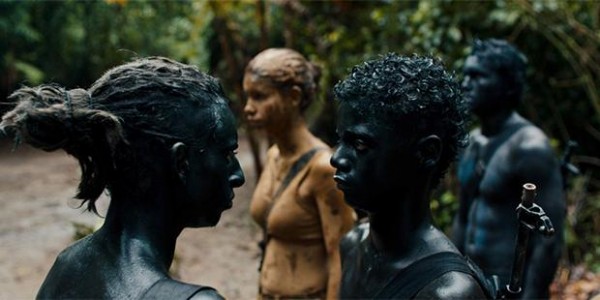
MOISÉS ARIAS (LEFT) IN MONOS
Teen guerrillas run amok
The Guardian's Peter Bradshaw raved, understandably, about Brazilian-born Alejandro Landes' explosive, enveloping film about teenage soldiers run wild. He called it "the best thing I have seen at Berlin this year: something between Apocalypse Now, Lord of the Flies and Embrace of the Serpent," and that's a good place to start. It also reminded me strongly of Carlos Reygadas, and Lisandro Alonso's 2004 film Los Muertos. This is a Latin American Heart of Darkness inhabited by adolescents.
It's a gang of teenage fighters, boys and some girls, with an American woman hostage. They're ostensibly commanded by a small, muscular Indio type called Mesajero (Messenger, Wilson Castro)who holds them in a military formation and gives them instructions. But let's make clear right away that it's not particularly what is going to happen in this movie that you will take away with you but it's palpable sense of humans gone feral. These kids go wild like in Lord of the Flies but it's different, because they start out as part of a guerrilla organization somewhere else, with which they are in radio contact.
Mesajero assembles them in military ranks and gives them instructions. He puts Wolf (Lobo, Julián Giraldo) in charge. They have gang nicknames. There is Perro (Dog, Paul Cubides); little Pitufo (Smurf, Deibi Rueda); innocent-looking Boom Boom (Sneider Castro); three girls, Leidi (Lady, Karen Quintero), Sueca (Swede, Laura Castrillón), and the oddly named Rambo (Sofia Buenaventura). Then there is the wiry, dangerous Patagrande (Bigfoot, played by New York-born actor Moisés Arias)
Their task is to take care of an American hostage, a woman engineer they call La Doctora, Sara Watson (Julianne Nicholson). They now have been entrusted a cow, for whose well-being Wolf is responsible. But they have a celebration, they get drunk and fire off their weapons, and Dog misfires and kills the cow. Wolf is held guilty and imprisoned, and he commits suicide, whereupon Bigfoot takes charge. So everything has gone very bad very quickly. Not to waste good meat, they skin and cut up and roast and eat all they can of the cow meat. We see all this.
Where the cow lived and died they fall into its shit, and in it discover "fungitos", i.e, "'shrooms," magic mushrooms. There's more wildness.
Hostilities and rivalries arise, but also sexual relationships, which are allowed if requested. They move from the mountains down into the jungle, and when La Doctora starts trying to escape the new leader goes into a rage and partly destroys the radio that is their link to 'The Organization,' a sign of disintegrating order that's plain to see - or hear, since thee raucous and powerful sound score by Mica Levi, is one of the mechanisms that drives the action and the scene into our consciousness most irresistibly; it's so good it continues to surprise us even during the closing credits, which in themselves are beautiful. Monos is an exhilarating experience. It really leaves you speechless. Some, however, such as Keith Urlich in his Hollywood Reporter review, have spoken up in disapproval of the film as "irresponsible." Of course it is! They killed a cow. And in some scenes they may have put the young actors in danger. But Alejandro Landes and everyone concerned have created for us a wonderfully vivid, intense, and memorable screen experience. Consider what Rory O'Connor said in CineVue: it's "nothing short of an aesthete’s dream, a film crammed with visual bravado that at various times echoes Kubrick, Malick, and Coppola’s Apocalypse Now." One may be tempted to bend the rules for such an experience and such a filmmaker.
Monos TRAILER
Monos, 108 mins., debuted at Sundance, winning its Special Jury Prize in the World Cinema Dramatic competition.Monos has received major reviews and has received a Metascore of 82. At its Berlinale debut, Peter Bradshaw reviewed Monos for the Guardian, giving it five out of five stars and writing a rave review: "This overpoweringly tense and deeply mad thriller from Colombian film-maker Alejandro Landes is the best thing I have seen at Berlin this year: something between Apocalypse Now, Lord of the Flies and Embrace of the Serpent." Screened for this review as part of the Film Society of Lincoln Center-Museum of Modern Art joint series New Directors/New Films, March 2019, which is the New York Premiere, and the Centerpiece Film of ND/NF.
Previously reviewed by me: Alejandro Landes' 2011 Porfirio (ND/NF 2012). Landes was born in Brazil of a Colombian mother and Ecuadorian father, educated at Brown University and later employed as a writer for the Miami Herald. He is thirty-nine.

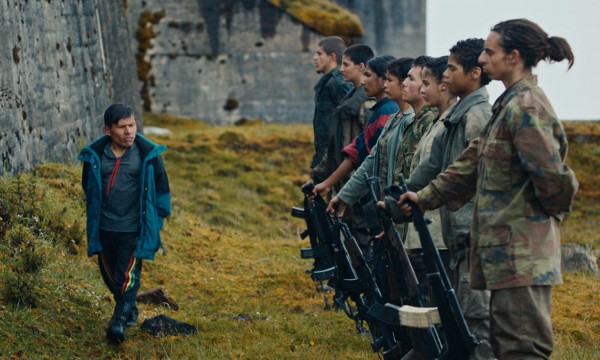
WILSON CASTRO (LEFT) IN MONOS
Last edited by Chris Knipp; 03-13-2019 at 07:10 PM.
-
MANTA RAY (Phuttiphong Aroonpheng 2018)
PHUTTIPHONG AROONPHENG: MANTA RAY/KRABEN RAHU (2018)
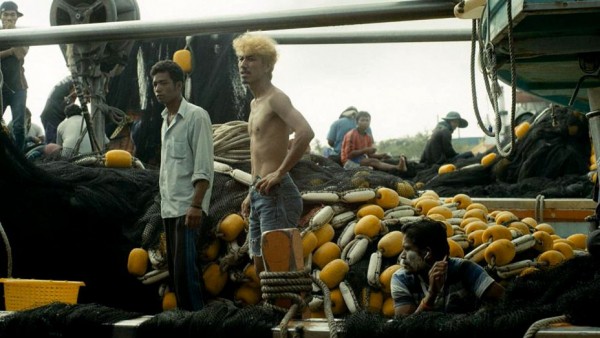
WANLOP RUNGKUMJAD (RIGHT) IN MANTA RAY
Rescue
Cinematographer Phuttiphong Aroonpheng's directorial debut is a complex and haunting film whose storytelling has several layers. The story told in Manta Ray is complicated and verges on the mythical.
The film opens on a man in a place of mangroves and forest carrying an automatic weapon. It is a wild looking scene. The ground is sprinkled with flickering lights. The man is draped in a wire of flickering lights too. Later, this place seems to be a killing field, but also a site of semi-precious stones a fisherman has often visited, but is afraid of at night.
We meet a scrawny, bleach-haired young fisherman (Wanlop Rungkumjad). He is rummaging through a muddy forest plain when he comes across a corpse. But the man is not dead, only nearly starved and with a bleeding chest wound. (It turns out he is a Rohingya muslim - many die in this region). The fisherman rescues him and takes him home, nursing him back to life.
As he recovers, the man (Aphisit Hama) turns out to be mute. The fisherman arbitrarily gives him a name, Thongchai, after the Thai pop superstar Bird Thongchai.
Here's a nice idea: a companion who is mute, and also needy, because he's a refugee, and you've rescued him. He keeps you company, he follows you around and helps you, and he makes no trouble. The scenes for a while are peaceful, because Thonghai is soothing company, and the man don't speak. Thonghai indeed follows the fisherman around, helping with chores and riding with him in the sidecar attached to his motorcycle.
Reviews of the film note its "humanism." But is the fisherman doing a good deed, or partly seeking company, and partly atoning for his own as yet unrevealed multiple sins? The fisherman talks to Thonghai (he seems to understand), and tells him one day that he had a wife,but she left him for another man. He is very angry at her and at the man. So Thonghai provides the fisherman with needed company and a soothing presence.
They go back to the forest plain and listen to the earth. The fisherman teaches Thonghai to collect gemstones that he uses to attract and catch manta rays. At night they glow in the ground, he says, but men are afraid to come then because there are so many bodies of the dead here.
In a scene that rhymes with the gemstones in the forest, the fisherman rigs his shack with fairy lights that flicker, and he and Thonghai sway to a dreamy electronic tune. It almost seems for a moment they will become lovers. It's pretty clear the fisherman is also something else, maybe a hitman, himself guilty of murders in the mangrove swamp and indeed atoning (feebly) with the rescue of Thonghai, when he suddenly gets a phone call and answers, "Boss, I don’t want to do this anymore." Not surprisingly, he soon disappears, and Thonghai is left alone to live by himself in the shack and ride around in the fisherman's motorcycle with its sidecar. But there are more surprises to come.
Unfortunately this film gets so involved in its mood-weaving that it winds up taking a little too long to end. Nonetheless the spell it weaves, with its haunting mangrove swamp, mix of calmness and danger, and its ambiguous and changing intimacies, never ceases to be fascinating and promising for the director's future work.
Manta Ray/Kraben rahu, 105 mins, debuted at Venice 7 Sept. 2018. It was reviewed there for Hollywood Reporter by Clarance Tsui. Also reviewed at Venice for Variety by Richard Kuypers, who calls it "promising" and notes that itt "is likely to be pleasurably hypnotic for many viewers." He rightly comments the editing team of Lee Chatametikoolf, who has cut most of Apichatpong Weerasethakul’s films, and "rising young talent Harin Paesongthai," plus dp Nawarophaat Rungphiboonsophi and the French team of Christine Ott and Matthieu Gabry who did the atmospheric sound designs. Shown at eight other festivals, including Toronto, Vancouver, and Rotterdam.Screened for this review as part of the 2019 MoMA-Film Society of Lincoln Center New Directors/New Films series.
Last edited by Chris Knipp; 03-13-2019 at 10:25 AM.
-
END OF THE CENTURY/FIN DE SIGLO (Lucio Castro 2019)
LUCIO CASTRO: END OF THE CENTURY/FIN DE SIGLO (2019)
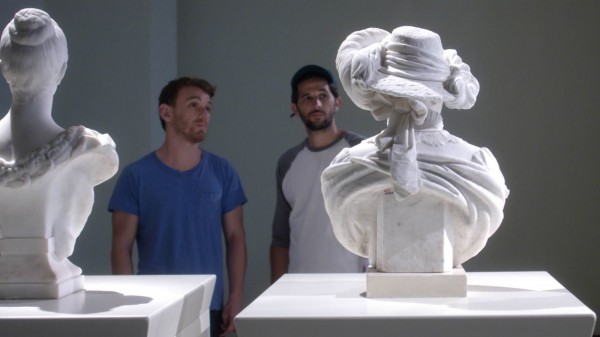
RAMON PUJOL AND JUAN BARBERINI IN END OF THE CENTURY
Multiple hookups; perhaps a long term relationship? A gay puzzler set in Barcelona
Lucio Castro studied at the Parsons school of design, and has a fashion line that "focuses on clean and ethical production, offering contemporary menswear with attention to texture, unique fabrics, and masculine proportions." The line lays claim to a "cinematic spirit, stemming from Castro’s passion for filmmaking and interest in building character through clothing." Had I known this, I might have paid more attention to the clothing the two men wear in the film, End of the Century/Fin de siglo. In retrospect nothing stands out. The weather in Barcelona was warm. The man were lightly clad. Notable only was a black T shirt with the word "KISS" emblazoned on it in white letters, worn by Javi (Ramon Pujol). Its cinematic spirit is uncertain, but it catches the eye of Ocho (Juan Barberini), the other man, who invites its wearer up. Javi asks for water, then relents and joins Ocho in a beer, one thing leads to another and - they have to go out to buy condoms. Eventually the deed is done.
But this film isn't so much about sex, or encounters, though the gay men's hookup app "Grindr" is mentioned, pronounced, in Spanish, "Green-dir." This is very physical, yes, a thing of hot sex, sunshine, beers, and an attractive airbnb flat with a built in fridge I couldn't help envying. But it's a mindbender. One of the men says he has been in a relationship for twenty years. It seems mildly implausible, since he seems young. Later, there is another meeting, another pickup, more sex - between the same two men. Only it is happening - twenty years ago? They'd forgotten they knew each other. Or are these other lives? One of them has a child. Both of them, at one point, were involved with a woman. One of them was married to a man. But the married men don't have sex with each other very often, if at all. They think that normal enough. On the other hand, one declines to have sex again, because he's married, and there's a limit, evidently, on the openness.
The basic idea, that two men could meet in Barcelona , have brief, intense sex, and later discover that they were together twenty years ago, is quite plausible, especially since they both have a bland clone quality - pleasant but forgettable - except that twenty years ago is a long time for men who look this young, and in the two separate sequences they don't look a different age. But when alternate lives start being mentioned, things become confusing. This is an amiable and pleasant film. But it's not only hard to follow. It's also ultimately hard to care about. Even this Barcelona has been rendered neutral and modern, Gaudí- and Ramblas-free. Talk of Y2K and making a film about the year 2000 also puzzles, since everything seems of the present day, like searching the internet for information about AIDS.
End of the Century/Fin de siglo, 84 mins., will have its World Premiere at New Directors/New Films, Mar. 2019, where it was screened for this review.
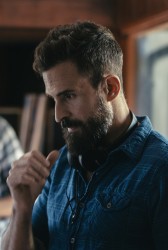
LUCIO CASTRO
Last edited by Chris Knipp; 03-12-2019 at 09:39 PM.
-
CLEMENCY (Chinonye Chukwu 2019)
CHINONYE CHUKWU: CLEMENCY (2019)
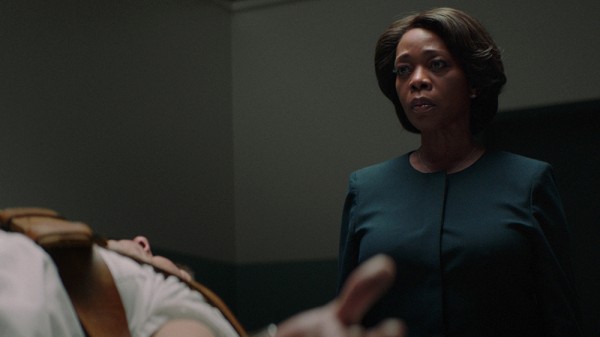
ALFRE WOODARD IN CLEMENCY
A blunt instrument of a film that's a powerful indictment of capital punishment and death row practices
Clemency is a film that seems so long I thought it ought to be a mini-series - or an opera. Powerful but rather heavy-handed, it is full of drama and full of woe, and there is one long, loud wail that might be more ennobling and memorable as an aria. This is a story "ripped from the headlines." The new California governor, Gavin Newsom, has just announced a moratorium on capital punishment in the state. The lengthy delays everywhere satisfy opponents of the death penalty, but are agonizing. So is the method of "lethal injection"- used at the prison in Clemency, which is headed by a black woman warden, Bernadine Williams (veteran actress Alfre Woodard, magnificent in this plum role), who has administered too many executions. Her marriage has come to a standstill. She drinks. Her rigid insistence that she is doing the right thing is frozen against her secret, inner awareness that it is all very, very wrong.
To make this blatantly clear, debut director Chinonye Chukwu provides an excruciating prologue depicting the botched execution of a Hispanic prisoner, Victor Jimenez (Alex Castillo), where the paramedic assigned to kill him can't find a working vein and keeps stabbing the man in more and more painful places until he writhes and screams in agony. (This has indeed happened.)
The focus shifts in the rest of the movie on another condemned man, a convicted cop killer Anthony Woods (Aldis Hodge, in another incredibly rich role), and we see him go through the gamut of emotions with Bernadine, a priest, his beleaguered lawyer Marty Lumetta (Richard Schiff of "The West Wing"), who, like the warden, has come to the end of his tether; and a long-missing wife and hitherto unknown son. Woods' story is one of endless tormenting dashed hopes. The case against him and the jury conviction seem to have disintegrated. That seems not to matter to the prison system. But it may matter to the governor, who, we're repeatedly told, can stay execution up to the very last minute.
The thrust of the film, which was also written by Chukwu, is to show the intolerable burden the capital punishment system imposes on everyone. This is a grim and powerful work. The acting is superb. But it, like Steve McQueen's Twelve Years a Slave, seems to revel in the punishment it metes out on the hapless viewers, rendering us too benumbed to do the intellectual work the complex issues demand of us. When it is not browbeating us, it is often lecturing us, as when Bernadine's estranged husband Jonathan (Wendell Pierce), a schoolteacher, is shown reading an extended passage from Ralph Ellison's Invisible Man.
The racial aspects of this story are hinted at, but not directly addressed. It's impossible not to think, when forced to contemplate for nearly two hours the cruel and ruthless punishment meted out on a black man for killing a putatively white cop, how aware even white people are now of the impunity with which American cops, mostly white, daily kill black men.
Clemency, 113 mins., debuted at Sundance, winning the Grand Jury Prize for U.S Dramatic films at the festival, first win of this award by a black woman director. Reviewed at Sundance by Amy Nicholson for Variety and by David Rooney for Hollywood Reporter as well as in Playlist, RogerEbert.com and IndieWire. Screened for this review as part of New Directors/New Films, Mar. 2019 at Lincoln Center and MoMA. New York Premiere.
Last edited by Chris Knipp; 03-15-2019 at 06:52 AM.
-
GENESIS/GENÈSE (Philippe Lesage 2018)
PHILIPPE LESAGE: GENESIS/GENÈSE (2018)
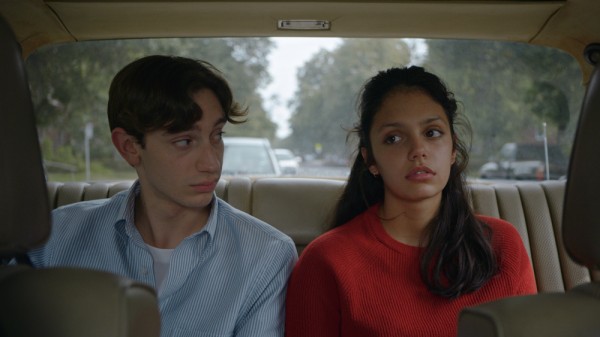
THÉODORE PÉLLERIN,, NOÉE ABITA IN GENESIS/GENÈSE
Love problems of a Québecis generation
Following up on his autobiographical 2015 debut The Demons (SFIFF 2016), French Canadian auteur Philippe Lesage continues to chronicle the life of young Félix (Édouard Tremblay-Grenier), now grown from fearful schoolboy to timid teen.
But Félix figures only in a final section. Taking center stage this time are step-siblings Guillaume (Théodore Pellerin) and Charlotte (French actress Noée Abita). Their separate amorous troubles alternate, along with frequent recourse to dance scenes depicting teen revelry. Central are doings at Guillaume's posh all-male boarding school, eventually involving a fourteen-year-old named Alexis (Antoine Marchand-Gagnon), who develops too much of an attraction to Guillaume, just as Guillaume becomes dangerously enamored of his best friend, Nicolas (Jules Roy Sicotte). Some scenes take place at the school dormitory, others at night when drinking has gone on. Charlotte wavers between her steady, Maxime (Pier-Luc Funk from The Demons), and several older guys, who prove untrustworthy, to put it mildly.
There are some arresting classroom scenes at Guillaume's school, mainly involving Guillaume and his homeroom teacher, Perrier (Paul Ahmarani), who not only talks frankly to the class about sex, but harshly critiques certain of his charges, particularly Guillaume. On one occasion he encourages Guillaume to do a lengthy imitation of himself, on others he abuses the boy.
Lesage is telling stories that evoke the teen years. He's not worried about unity. Perhaps he's a little inspired by Arnaud Desplechin's Golden Days/Trois souvenirs de ma jeunesse? An admirable model, if so, but a difficult one, and even Desplechin doesn't fare equally well with all his subplots. At the end of Genesis, we drop Guillaume, Nicolas, Alexis, Charlotte, and Charlotte's boyfriend Maxime, for a final section at traditional adjoining boys and girls summer camps, where The Demons'Félix, who sings now and performs in a sweet guitar duo song for the combined camps, timidly woos Beatrice (Émilie Bierre). They are perhaps the Adam and Eve of Lesage's adolescent Genesis.
If this sounds complicated, it is. While Lesage shows a gift for serious and sometimes arresting depictions of what may appear on the face of them clichéd situations, this film seems at times bewilderingly diffuse, and could obviously have used some trimming and rearranging. It doesn't even try to have narrative drive, and drops some important events (such as a drunken party rape of one of the main characters) without a followup. Perhaps some threads will be picked up in later installments. Anyway Lesage continues to be a remarkably talented chronicler who has enlisted some very engaging young actors to tell his tales, the already experienced Théodore Pellerin being the most vivid one here, worthy of his own separate and exclusive bildingsroman.
Genesis/Genèse, 130 mins., debuted at Locarno Aug. 2018. It was reviewed by Boyd van Hoeij at Locarno for Hollywood Reporter and by Guy Lodge for Variety and in The Apologist by Sven Papaud. Screened for this review as part of the Film Society of Lincoln Center-Museum of Modern Art New Directors/New Films series (Mar. 27-Apr. 7, 2019).
ND/NF Showtimes: March 30, 2:30 PM; March 31,6:00 PM
U.S. Premiere
EXCERPT of the film: Perrier gets tough with Guillaume.
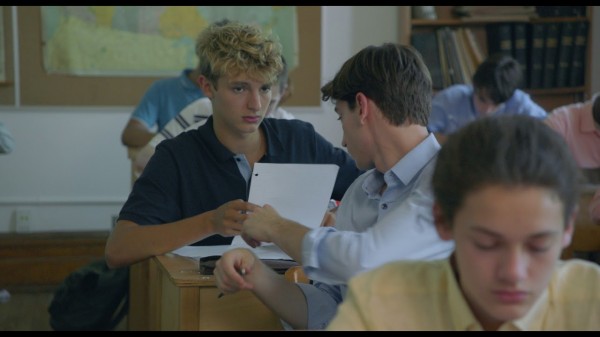
THÉODORE PÉLLERIN (TURNING AROUND) IN GENESIS/GENÈSE
Last edited by Chris Knipp; 03-15-2019 at 07:17 AM.
 Posting Permissions
Posting Permissions
- You may not post new threads
- You may not post replies
- You may not post attachments
- You may not edit your posts
-
Forum Rules





 Reply With Quote
Reply With Quote










Bookmarks